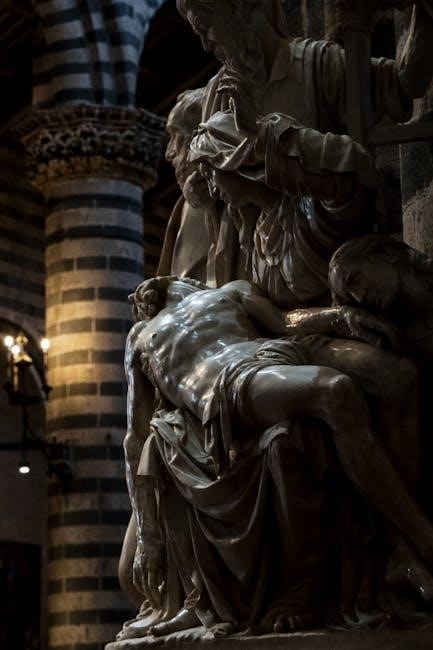The Official Manual of the Church of God in Christ (COGIC) serves as a foundational document, outlining the denomination’s principles, governance, and spiritual practices. It provides guidance for both new and seasoned members, ensuring unity in doctrine and practice across the church. This manual is essential for understanding the church’s structure, beliefs, and operational standards, fostering a cohesive and spiritually vibrant community.
1.1 Overview of the Church of God in Christ (COGIC)
The Church of God in Christ (COGIC) is a prominent Pentecostal Holiness denomination founded in 1897. It emphasizes the Holy Spirit’s power, biblical authority, and transformative worship. COGIC is a global church with millions of members, focusing on evangelism, spiritual empowerment, and community impact. Its mission is rooted in spreading the Gospel and fostering a Spirit-led lifestyle, making it a cornerstone of modern Pentecostalism.
1.2 Purpose and Importance of the Official Manual
The Official Manual serves as a comprehensive guide for the Church of God in Christ, outlining its beliefs, practices, and governance. It ensures uniformity in doctrine and procedure across all levels of the church. This document is essential for maintaining order, promoting spiritual growth, and preserving the church’s legacy. It provides clarity on expectations, responsibilities, and protocols, fostering unity and accountability among members and leadership.
Historical Background of the Church of God in Christ
The Church of God in Christ (COGIC) was founded in 1897 by Charles Harrison Mason, emphasizing Holiness and the Baptism of the Holy Spirit. It emerged from the Holiness movement within the African-American religious experience, focusing on spiritual renewal and Pentecostal doctrine. This historical foundation has shaped COGIC into a globally recognized denomination, deeply rooted in its mission to spread the Gospel and uphold sacred traditions.
2.1 Founding and Early History
The Church of God in Christ (COGIC) was founded in 1897 by Charles Harrison Mason, emerging from the Holiness movement. Initially, it faced challenges, including a split from the Mt. Sinai Holy Church. In 1897, Mason officially incorporated COGIC in Arkansas. The Azusa Street Revival in 1906 significantly influenced the church, leading to the adoption of Pentecostal doctrines. Early growth was steady, with COGIC becoming a prominent African-American Pentecostal denomination, emphasizing spiritual renewal and missionary work.
2.2 Key Figures and Their Contributions
Charles Harrison Mason, founder of COGIC, played a pivotal role in shaping the denomination. His wife, Lelia Mason, supported early church efforts. C.H. Mason Jr., his son, expanded COGIC’s reach. O.T. Jones Sr., an influential bishop, contributed to the church’s organizational structure. These leaders laid the foundation for COGIC’s growth, blending Holiness and Pentecostal teachings, and fostering a legacy of spiritual leadership and community impact.

Core Beliefs and Doctrines
The Church of God in Christ upholds the authority of the Bible, emphasizes salvation through Jesus Christ, and affirms the Holy Spirit’s transformative power in believers’ lives daily.
3.1 Statement of Faith
The Church of God in Christ declares its faith in one God, eternally existing in three persons: Father, Son, and Holy Spirit. It affirms Jesus Christ as Savior and Lord, born of a virgin, crucified for sin, resurrected, and coming again. The Bible is the infallible Word of God, and salvation is by grace through faith. Believers are empowered by the Holy Spirit for holy living and service.
3.2 Sacraments and Ordinances
The Church of God in Christ observes sacred rites as acts of worship and obedience. Baptism by immersion symbolizes spiritual rebirth, while the Lord’s Supper commemorates Christ’s sacrifice. Foot washing, based on Jesus’ example, fosters humility and unity. These ordinances are essential for spiritual growth and reflect the church’s commitment to biblical teachings and Christ-centered living.
Governance and Structure
The Church of God in Christ operates under a structured governance system, with a clear hierarchy of leadership roles and a defined framework for administration.
4.1 Hierarchy and Leadership Roles
The Church of God in Christ follows a hierarchical leadership structure, beginning with the Presiding Bishop at the highest level. Bishops oversee jurisdictions, while pastors and elders lead local congregations. Other key roles include district superintendents, state overseers, and general officers, each carrying specific responsibilities to ensure spiritual and administrative guidance. This structured hierarchy ensures effective governance and maintains order within the denomination.
4.2 Regional and Local Church Administration
Regional administration is overseen by bishops and district superintendents, ensuring alignment with COGIC’s mission. Local churches are led by pastors, supported by boards and auxiliaries. This dual structure promotes accountability and unity, allowing regional leaders to guide while local churches maintain autonomy. Effective administration at both levels fosters spiritual growth, operational efficiency, and adherence to the church’s official manual.

Worship and Practices
The Church of God in Christ’s worship and practices are deeply rooted in spiritual traditions, emphasizing prayer, music, and sacraments to strengthen faith and unity.
5.1 Worship Services and Liturgy
COGIC worship services are vibrant, Spirit-led experiences blending prayer, praise, and preaching. The liturgy includes hymns, gospel music, and sacraments like baptism and communion, fostering a deep connection with God and unity among believers. Services often feature dynamic preaching, altar calls, and expressions of faith, creating an atmosphere of reverence and spiritual renewal for all attendees.
5.2 Holy Days and Special Observances
COGIC recognizes key holy days, including Easter, Christmas, and Resurrection Sunday, celebrating Christ’s life, death, and resurrection. Special observances like Pentecost Sunday honor the Holy Spirit’s outpouring. The church also observes fasting periods, prayer days, and seasonal reflections, fostering spiritual renewal and communal connection. These traditions strengthen faith, unity, and devotion among members, aligning with COGIC’s biblical and Pentecostal heritage.

Membership and Discipleship
Membership in COGIC emphasizes spiritual growth, fellowship, and discipleship, guiding believers to live according to biblical teachings and uphold the church’s values. Discipleship fosters mature, committed followers of Christ.
6.1 Requirements for Membership
Membership requires a confession of faith in Jesus Christ, repentance, and baptism in water and the Holy Spirit. Applicants must adhere to COGIC teachings, doctrines, and discipline, demonstrating a commitment to holy living and active participation in church life. Local churches may have additional requirements, but all members must align with the foundational principles outlined in the Official Manual.
6.2 Spiritual Growth and Development
Spiritual growth is essential for all members, achieved through prayer, fasting, and consistent Bible study. Regular worship, fellowship, and participation in ministries foster deeper faith. The church encourages personal devotion, accountability, and mentorship to help believers mature in Christ. Spiritual development is further supported through discipleship programs, retreats, and teachings that emphasize holiness and a life dedicated to God.
Leadership and Ministry
Leadership in COGIC is rooted in biblical principles, emphasizing integrity, humility, and a commitment to serving God and humanity. Ministers are called to shepherd, teach, and guide the flock, fostering spiritual growth and unity within the church.
7.1 Qualifications for Leadership
Leaders in COGIC must meet specific spiritual and moral standards. They are expected to demonstrate a deep commitment to Christ, uphold biblical teachings, and exhibit moral integrity. Leaders should possess strong communication skills, a servant-hearted attitude, and a willingness to disciple others. Additionally, they must be actively involved in the church, adhere to its doctrines, and maintain a lifestyle that reflects godly character and accountability.
7.2 Ministerial Duties and Responsibilities
Ministers in COGIC are entrusted with preaching, teaching, and guiding the congregation spiritually. They must lead worship services, provide pastoral care, and disciple members. Ministers are also responsible for overseeing church programs, counseling, and performing sacraments. They must remain accountable to church leadership, adhere to the Official Manual, and actively engage in evangelism and community outreach, fulfilling their role as spiritual shepherds.
Missions and Outreach
Missions and outreach are central to COGIC’s commitment to spreading the Gospel globally, fostering evangelism, and serving communities through compassionate ministries, ensuring spiritual and social transformation worldwide.
8.1 Global Missions and Evangelism
The Church of God in Christ emphasizes global missions and evangelism, spreading the Gospel worldwide through church planting, missionary work, and partnerships. COGIC missionaries evangelize, disciple, and establish churches across various nations, focusing on spiritual growth and community transformation. The church prioritizes cultural sensitivity and collaboration with local leaders to ensure effective ministry and sustainable impact globally.
8.2 Community Service and Social Justice
The Church of God in Christ is deeply committed to community service and social justice, addressing issues such as poverty, inequality, and injustice. Through various ministries, COGIC engages in outreach programs, including food banks, educational initiatives, and health services, to empower and uplift communities. These efforts reflect the church’s mission to demonstrate compassion and advocate for systemic change, aligning with its holistic approach to ministry and discipleship.

Education and Training
The Church of God in Christ emphasizes education and training as foundational for spiritual growth and leadership development, equipping members and leaders through comprehensive programs within the church.
9.1 The Role of Sunday School and Bible Study
Sunday School and Bible Study are vital components of COGIC’s educational framework, designed to deepen members’ understanding of Scripture and foster spiritual growth. These programs provide structured learning opportunities for all ages, promoting fellowship and discipleship. They serve as foundational tools for equipping believers with biblical knowledge, enabling them to apply faith principles in daily life and effectively serve in ministry.
9.2 Ministerial Training and Certification
Ministerial training and certification in COGIC are designed to equip leaders with biblical knowledge, spiritual discernment, and practical skills for effective ministry. The program emphasizes theological education, leadership development, and hands-on experience. Candidates undergo rigorous study, mentorship, and evaluation to ensure they meet the standards of the church. Certification validates their readiness to serve faithfully, upholding the doctrine and mission of COGIC with integrity and excellence.

Ethical Guidelines and Discipline
The Ethical Guidelines and Discipline section ensures integrity and accountability among members and leaders, promoting a culture of respect and holiness. It provides a clear framework for addressing misconduct, ensuring consistency and fairness in upholding the church’s moral standards and spiritual principles.
10.1 Code of Conduct for Members and Leaders
The Code of Conduct outlines ethical standards for all members and leaders, emphasizing biblical principles, moral integrity, and Christ-like behavior. It mandates respect, honesty, and accountability, ensuring members uphold the church’s values. Leaders are held to a higher standard, serving as role models and stewards of the church’s mission. Adherence to this code fosters unity, trust, and spiritual growth within the congregation.
10.2 Procedures for Addressing Misconduct
The Church of God in Christ Official Manual outlines structured procedures for addressing misconduct, involving church leaders and disciplinary committees to ensure fairness and confidentiality. These processes aim to restore individuals while upholding biblical principles and church values, emphasizing accountability and the integrity of the church community. Proper documentation and adherence to established guidelines are essential throughout the process.

Financial Stewardship and Management
Financial stewardship is a cornerstone of COGIC, ensuring resources are managed with integrity and accountability to support the church’s mission, operations, and community outreach effectively.
11.1 Tithing and Offerings
Tithing and offerings are essential practices in COGIC, rooted in biblical principles. Members are encouraged to contribute a tenth of their income as tithing, while offerings are additional contributions for specific purposes. These funds support ministries, community programs, and the maintenance of places of worship, reflecting a commitment to faith, gratitude, and stewardship.
11.2 Budgeting and Resource Allocation
Budgeting and resource allocation in COGIC are governed by principles of transparency and accountability. The church prepares annual budgets to manage tithes, offerings, and other income, ensuring resources are allocated to ministries, community outreach, and operational needs. Leaders are expected to steward funds wisely, prioritizing initiatives that align with the church’s mission and values, while maintaining fiscal integrity and accountability to the membership.
Concluding the Official Manual, the Church of God in Christ reaffirms its commitment to spreading the gospel and fostering spiritual growth. Embracing future challenges with faith, COGIC remains dedicated to its mission, guided by divine principles and a vision of unity and evangelism, ensuring continued growth and impact.
12.1 The Manual as a Guide for Future Growth
The Official Manual serves as a vital guide for the Church of God in Christ’s future growth, ensuring unity in doctrine and practice. It equips leaders and members with clear directives, enabling the church to address emerging challenges while remaining faithful to its mission. By adhering to the manual’s principles, COGIC will continue to expand its spiritual influence and foster a thriving, mission-driven community.
12.2 Adapting to Changing Times While Maintaining Tradition
The Church of God in Christ balances progress with preserving its rich heritage. By embracing modern tools and methods while staying rooted in biblical principles, the church remains relevant in a shifting world. This approach ensures the denomination continues to thrive, honoring its spiritual roots while meeting the needs of future generations.

